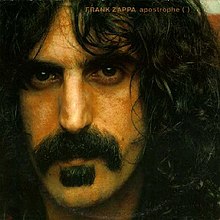Apostrophe(')
| Apostrophe (') | ||||
|---|---|---|---|---|
 |
||||
| Studio album by Frank Zappa | ||||
| Released | March 22, 1974 | |||
| Recorded | 1969 - January 1974 at Electric Lady Studios, NYC; Bolic, Inglewood and Paramount Studios, Hollywood | |||
| Genre | Comedy rock, progressive rock, hard rock, jazz fusion | |||
| Length | 32:02 | |||
| Label | DiscReet | |||
| Producer | Frank Zappa | |||
| Frank Zappa chronology | ||||
|
||||
| Singles from Apostrophe (') | ||||
|
||||
| Professional ratings | |
|---|---|
| Review scores | |
| Source | Rating |
| Allmusic | |
| Robert Christgau | B− |
| Džuboks | favorable |
| Rolling Stone | favorable |
Apostrophe (') is an album by Frank Zappa, his eighteenth, released on March 22, 1974 in both stereo and quadraphonic formats. An edited version of its lead-off track, "Don't Eat the Yellow Snow", was the first of Zappa's three Billboard Top 100 hits, ultimately peaking at number 86.
Apostrophe (') remains Zappa's most commercially successful album in the United States. It was certified gold by the RIAA on April 7, 1976 and peaked at number 10 (a career-high placement) on the Billboard 200 chart in 1974. Continuing from the commercial breakthrough of Over-Nite Sensation (1973), this album is a similar mix of short songs showcasing Zappa's humor and musical arrangements. The record's lyrical themes are often bizarre or obscure, with the exception of "Uncle Remus", which is an extension of Zappa's feelings on racism featured on his earlier song "Trouble Every Day".
The first half of the album loosely follows a continuing theme. "Don't Eat the Yellow Snow" and "Nanook Rubs It" tell of a dream the singer had where he saw himself as an Eskimo named Nanook. It continues into "St. Alfonzo's Pancake Breakfast," which Zappa said was inspired by a television commercial for Imperial margarine.
As was the case with many of Zappa's albums, Apostrophe (') was a melange of archival and recent recordings; side one of Apostrophe (') (1974) and Over-Nite Sensation (1973) were recorded simultaneously. The tracks on side two originate from various 1972 sessions with overdubs recorded in 1973 and 1974, except for "Excentrifugal Forz", where the drum track (played by Johnny Guerin) originally came from the Hot Rats sessions in 1969 (along with the bass and drum tracks for "Lemme Take You to the Beach" on Studio Tan (1978) and Läther (1996), although in the case of "Excentrifugal Forz" this is not actually noted in either the album liner notes or official correspondence), and "Stinkfoot", where the basic track, possibly originally known as "The Bass & Drums Song", dates from the Chunga's Revenge sessions in early 1970.
...
Wikipedia
